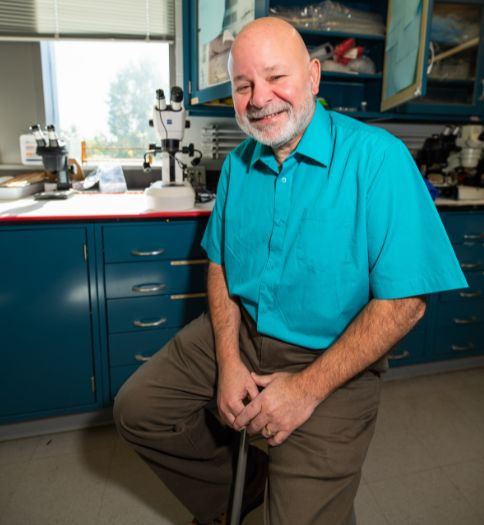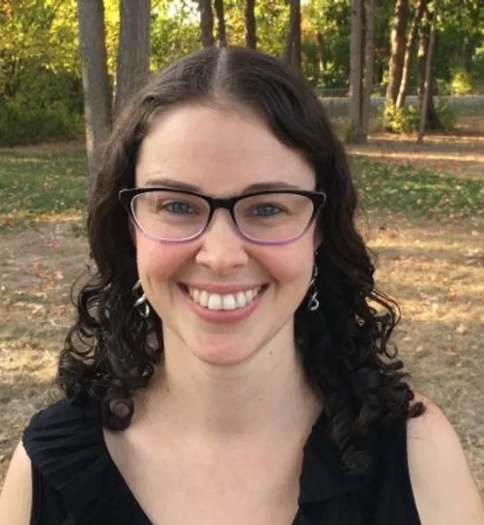Two WCU Biologists Named to New Online Directory Recognizing Contributions of Hispanic and Latinx Scientists
Dr. Oné R. Pagán and Dr. Manuela Ramalho, both WCU biology faculty, have been named to the Atlas of Inspiring Hispanic/Latinx Scientists, a grassroots effort developed to showcase the expertise, talents, and diversity of Hispanic and Latinx scientific faculty in the United States. The atlas was created as a space to build community and create mentorship opportunities.

In his native Puerto Rico, Dr. Oné Pagán earned a bachelor’s degree in natural sciences and a master’s degree in biochemistry. He was a non-traditional student in his late 30s with a family to support when he came to the United States to earn his doctorate in pharmacology at Cornell University.
Students work with him in his lab where research focuses on planaria, the flatworms that possess the ability to regenerate lost body parts. With a neurotransmitter system and brain chemistry similar to vertebrate mammals, Dr. Pagán says they are ideal for pharmacology research. “We use them as models to try to come up with strategies to minimize or even prevent toxicity from abused drugs,” he explains. Other experiments use planaria to gauge the toxicity of pesticides in water. Another aspect of his research focuses on planarias’ regenerative ability.
Planaria were the focus of Dr. Pagán’s first book, The First Brain: The Neuroscience of Planarians (Oxford University Press, 2014). A second edition will be published in 2025. His classroom teaching inspired his next two books: Drunk Flies and Stoned Dolphins: A Trip Through the World of Animal Intoxication (2021) and Strange Survivors: How Organisms Attack and Defend in the Game of Life (2018). Published by BenBella Books, both were written to introduce fascinating scientific information to a non-science audience.

A cell and molecular biologist from Brazil, Dr. Manuela Ramalho studied at UNESP – Rio Claro and is broadly trained in host-microbe interactions at the genomic, cellular, organismal, and ecological levels. Her research focuses on understanding the mechanisms that impact microbial communities, unraveling the role of ecology, diet, behavior, stage of development, and also phylogeny of the host in these symbiotic interactions. To better understand these mechanisms, she uses ants as a study model. In several ant genera, symbiotic interactions with microbial communities have been shown to have profound impacts on the host.
In addition to focusing on studying the microbiome of ants, Ramalho also advocates for a more diverse and inclusive scientific community. In her Ramalho Lab, a diverse group of scientists with different backgrounds conduct quality science with a commitment to promoting diversity supported by Dr. Ramalho’s experiences as a first-generation college student, a Latina woman in STEM, a parent in science, and an immigrant. Visit Dr. Ramalho’s lab here.
Nearly 400 Hispanic/Latinx Ph.D.-level scientists based in the United States are included in this inaugural edition of the online Atlas of Inspiring Hispanic/Latinx Scientists. The project is the work of Dr. Christina Termini, an assistant professor in the Translational Sciences and Therapeutics and Human Biology divisions at Fred Hutch, an independent, nonprofit organization and the only National Cancer Institute-designated cancer center in Washington state. “For rising generations of scientists, this atlas is about providing a forum of role models,” she notes.
Along with four colleagues from across the country, Termini expanded a list of 100 inspiring Hispanic and Latinx scientists in America that she created and published in the journal Cell in 2020. After experiencing significant interest in the initial list, the scientists created a permanent resource that could updated regularly.
A National Science Foundation report showed that from 2011 to 2021, the share of Hispanic and Latinx individuals working in STEM fields increased from 11% to 15%. Despite the overall rise in Hispanic and Latinx representation in STEM fields, in 2022 only 6% of post-secondary faculty members were Hispanic. The atlas is a step toward advancing equitable representation of Hispanic and Latinx individuals among university faculty positions and the broader scientific community.
Visit WCU’s biology department here.
